|
|
|
Sort Order |
|
|
|
Items / Page
|
|
|
|
|
|
|
| Srl | Item |
| 1 |
ID:
055487
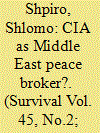

|
|
|
|
|
| Publication |
2003.
|
| Description |
p91-112
|
|
|
|
|
|
|
|
|
|
|
|
|
|
|
|
| 2 |
ID:
123060
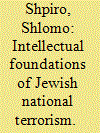

|
|
|
|
|
| Publication |
2013.
|
| Summary/Abstract |
The Lehi, a fringe Jewish paramilitary group created in 1940, conducted a concerted terrorist campaign against the British authorities in Palestine during and after World War II, proclaiming that its activities were undertaken in the name of national liberation. Lehi was founded and led by Avraham Stern, also known as "Yair." Scholar, intellectual, and poet, Stern developed a fundamental ideology of national and messianic Jewish terrorism, which became the ideological basis not only for the work of the Lehi, but also for later Jewish terrorist activism. The present article examines the intellectual foundations of Lehi terrorism and how its intellectual and ideological principles influenced Lehi's most controversial activities-internal terrorism and the execution of its own members. In conclusion, the author traces the impact of Stern's intellectual legacy on later generations of Jewish terrorists.
|
|
|
|
|
|
|
|
|
|
|
|
|
|
|
|
| 3 |
ID:
124921
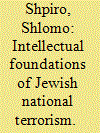

|
|
|
|
|
| Publication |
2013.
|
| Summary/Abstract |
The Lehi, a fringe Jewish paramilitary group created in 1940, conducted a concerted terrorist campaign against the British authorities in Palestine during and after World War II, proclaiming that its activities were undertaken in the name of national liberation. Lehi was founded and led by Avraham Stern, also known as "Yair." Scholar, intellectual, and poet, Stern developed a fundamental ideology of national and messianic Jewish terrorism, which became the ideological basis not only for the work of the Lehi, but also for later Jewish terrorist activism. The present article examines the intellectual foundations of Lehi terrorism and how its intellectual and ideological principles influenced Lehi's most controversial activities-internal terrorism and the execution of its own members. In conclusion, the author traces the impact of Stern's intellectual legacy on later generations of Jewish terrorists.
|
|
|
|
|
|
|
|
|
|
|
|
|
|
|
|
| 4 |
ID:
111619
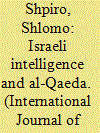

|
|
|
| 5 |
ID:
179137
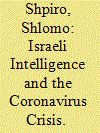

|
|
|
|
|
| Summary/Abstract |
The outbreak of the coronavirus crisis in Europe and the Middle East, in March 2020, caught the Israeli government and health authorities by surprise, unprepared for the scale and gravity of the incoming pandemic. In its efforts to provide fast and effective crisis management, and faced with a rapidly growing number of people infected with the coronavirus, the Israeli government turned to its Intelligence Community. Israel’s IC has a strong and long tradition as a key element within the structure of the state, and although ordinarily engaged in security and counterterrorism tasks, it was able to quickly adapt its considerable capacities to make a substantial contribution in the fight against the coronavirus.
|
|
|
|
|
|
|
|
|
|
|
|
|
|
|
|
| 6 |
ID:
108727


|
|
|
|
|
| Publication |
2011.
|
| Summary/Abstract |
Israel has been a target of Soviet intelligence collection since its independence in 1948. Operating out of the Soviet Embassy in Tel-Aviv, a large contingent of KGB case officers ran a string of agents deep inside Israel's security and diplomatic establishments. The article examines KGB human intelligence operations in Israel in the years 1948-67 and assesses the importance of diplomatic cover for effective human intelligence operations. Once diplomatic relations were severed, in 1967, the KGB lost much of its local capabilities and had to rely on 'illegal' case officers to run its agents in Israel, whose effectiveness was often compromised by Shabak double agent penetrations.
|
|
|
|
|
|
|
|
|
|
|
|
|
|
|
|
| 7 |
ID:
075683


|
|
|
| 8 |
ID:
087546


|
|
|
|
|
| Publication |
2009.
|
| Summary/Abstract |
Chemical and biological weapons are commonly referred to as weapons of mass destruction (WMD) because of their potential to kill thousands of people indiscriminately. This high lethality means that the manufacture, storage, and use of such weapons on the national level are generally forbidden, except for purely defensive research.
|
|
|
|
|
|
|
|
|
|
|
|
|
|
|
|
| 9 |
ID:
141629


|
|
|
|
|
| Summary/Abstract |
In June 1967, the Soviet Union abruptly cut off diplomatic relations with Israel and withdrew its embassy staff from Tel-Aviv, including its large KGB Rezidentura. To develop new sources of intelligence in Israel, the KGB recruited under duress hundreds of Russian Jews to spy in Israel in return for allowing their families to leave the Soviet Union. Most of these ‘recruits’ abandoned their task once they reached Israel, leaving Soviet intelligence with only a small number of agents in Israel who were handled by KGB illegal case officers working out of Russian churches. These agents were able to make careers in Israel and obtain some access to confidential military information, but generally failed to reach Israel's inner circle of political and military decision makers. This inner circle was only breached in 1983 by the treachery of a highly placed former Mossad officer who offered his services to the Soviets and became the KGB's best source for secret information deep inside the Israeli government.
|
|
|
|
|
|
|
|
|
|
|
|
|
|
|
|
| 10 |
ID:
089624


|
|
|
|
|
| Publication |
2009.
|
| Summary/Abstract |
Twenty-six experienced intelligence scholars and practitioners from seven countries, collaborated to create a short reader, an hour's read for busy people who recognize why ethics matter. This symposium presents summaries of the 13 essays selected for publication.
|
|
|
|
|
|
|
|
|
|
|
|
|
|
|
|
|
|
|
|
|